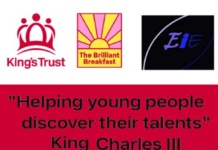
This is an eye-opening and a must-have-well-thought-out book for everyone; be you a parent hoping to give your undergraduate and adult children an edge, a politician, university professor, medical doctor, shadow secretary or even a serving Prime Minister. Reason being that if you’re not modelling your future career and that of your organisation to compete in a volatile and complex world, you would have missed the boat.
Not surprisingly, the backdrop has the making of a corporate world, and rightly so, as the spirit and the letter of it reveal page after page. But those outside of business will do themselves tremendous good in taking on board the priceless and timeless lessons portrayed through the lens of business organisations.
Aside starting off by liberalising leadership, arguing that you do not have to be a Nelson Mandela, Barack Obama or an Angela Merkel, as everyone can be a leader, Olomu said: “leadership is not the province of a select few.” However, he made it equally clear that a leader must of a necessity, equip themselves and make up for any deficiencies in skills attributes and charisma. This book will surely play its role as part of any effort in bridging the skills and knowledge gaps.
Citing the classic example of a former United States President, Harry Truman, who according to management guru, Peter Drucker , “did not have an ounce of charisma,” yet went on to be listed “among the most effective chief executives in U.S history.” In other words, anyone who’s willing to reinvent himself and pay the price to become a premium leader can take a cue from Truman.
The author backed this up by citing a 2014 study that described leadership as being thirty percent genetic and seventy percent learned. If all you get from the book is this disclosure, then it would have been worth the ink on which it was printed.
But there’re plenty more takeaways for businesses , as it soon became clear that the mission of this book is to give them the tools to not get crushed in this volatile, uncertain, complex and ambiguous – VUCA – age that the coronavirus pandemic has amplified .
Using the example of both Kodak and Polaroid as two iconic businesses who got crushed due to the “fixed mindset” and short-sightedness of their organisation’s leadership and lack of agility and vision , Olomu’s warnings cannot be said to be mistaken for someone crying wolf when there’s none in sight.
Had the leadership of Greensill Capital that former prime minister, David Cameron worked for after leaving Number 10, had the opportunity of getting a copy of this book and embracing the message in it, perhaps Mr. Cameron wouldn’t have needed to bombard the chancellor of the exchequer and other government officials and former subordinates with over 50 messages and emails, “lobbying for government loan for his employer.” Not only could thinking ahead creatively and collaboratively have saved the bank from closing shop, Cameron may not have had to go through the painful ordeal of being hauled before a select committee of Members of Parliament to defend his actions.
Challenging and equipping leaders and organisations to ditch their fixed mindset and develop a “growth mindset” and to think ahead, embrace innovation and then imagine what types of products and services might be needed in the future is what this book is all about. That was what Henry Ford did when he set out to invent Ford. Olomu noted that: “it is not enough to ask customers what they need today. You need to spend more time thinking on your thinking to figure out what they need tomorrow.”
That was what the legendary Ford did, as he famously said “if 1 had asked people what they wanted, they would have said faster horses.”
Olomu’s definitive message to those steering the ships of business organisations is that they must embrace the fact that “the skills and abilities that got us here won’t take us to the future.” As a matter of fact, suffice it to add that the “contacts” won’t be of help either, as Cameron and Greensill have painfully discovered.
Hence, he made the case for embracing both adaptability and innovation as the new normal for surviving the volatile, uncertain complex and ambiguous (VUCA) world that businesses must operate in. Otherwise, the organisation will soon be “gone with the wind.”
It’s a VUCA world and any organisation that wants to remain and stay ahead in business in future must not only use VUCA as its template for hiring and retaining its staff, they must adopt the strategy that SHELL took decades ago and plan ahead.
The book is laced with an avalanche of takeaways, ranging from coming to terms with the reality that the business environment and the world we live and do business in have changed. He kept hammering the need for anyone and organisation aspiring to become a premium leader to keep thinking ahead and take collaboration and partnership in their strides. When Steve Jobs retuned to the company he co-¬founded in the late ‘90s, he had to approach the rival Microsoft to reinvent Apple. Jobs had to play with the hand that was left for him and the rest is history.
What, among others should earn the book a place in university and organisations’ shelves is the fact that he used relevant case studies to back the argument. One of such was how David van Eekeren, steered the affairs of Land O’Frost, an Illinois-based organisation in 2008.
Though not part of the cases cited, but the fact that Elon Musk showed agility in saying Tesla will stop accepting bitcoins as a mode of payment for its electric cars due to climate change concerns about the cryptocurrency underlined the book’s timeliness message. The South African billionaire had earlier in February, said that customers could use them. But he had to quickly respond to the volatile, uncertain complex and ambiguous-VUCA- world and backtrack through a tweet on Thursday, May 13, 2021.
Olomu has written a premium book for agile, visionary and innovative leaders wishing to save themselves and their organisations from being run over in the years ahead. More importantly, this is one tiny step for the academia and a giant leap for leadership development. In fact, any university or organisation that doesn’t put it in their people’s hands should not be surprised if they become a byword like Polaroid and Kodak.
Aside the many already mentioned, reasons to embrace his priceless and timely message is further buttressed by the fact that he listed “ten incredible products and services that didn’t exist 20 years ago.” These incredible lists include; Android, which Sergey Brin and Steve Horowitz brought out in November 2007, the iPad, launched by Jobs at an Apple press conference on January 27, 2010 and not forgetting that Instagram, which made its way into our lives in October 2010 with just 25,000 on the opening day, was snapped up by Facebook just two years later for $1 billion.
On a final note, it is widely believed in certain quarters that curiously kills the cat, but that applies in the animal kingdom. For any organisation wanting to remain in business and be a premium leader, to not be curious is a deadly sin that may cost the employees their jobs and shareholders the much-needed returns on their investments.
Writer and author, Tunde Oyedoyin, has been the London correspondent of the Nigerian Guardian for over a decade. He’s the author of three books, including a novel and The Money Intelligent Handbook: 113 Questions & Answers on Your Personal Finance.
Other reviewers
Professor Erinma Bell MBE DL JP, Deputy Lieutenant for County of Greater Manchester said, His book The Premium Leader is truly a guide for those daring to aspire to begin to learn what it takes to lead in such a volatile environment.
This book is not just for the business world, because we are ALL leaders in whatever the field we find ourselves. The office, the home, the church, the primary school, the educational arena or the political or community activist. We all reside in such an ever changing environment. Just look at 2020. Did 2020 happen?
Nero Ughwujabo, former Special Adviser to the Prime Minister said, “We live in a disrupted world with an alarmingly increasing number of nations in crisis; many global leaders are falling short of the expectations of their populations, and a raging pandemic has shone a light on socio-economic disparities globally. In the book, Dayo Olomu engages the issues with veracity and rigor. The book captures important solutions, but also the practical steps leaders individual leaders in preparation for leadership.”
Kindly follow us on twitter:@AfricanVoice2








